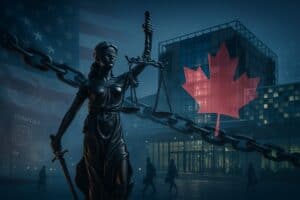In February 2025, the United States escalated its long-running hostility toward the International Criminal Court (ICC). Through Executive Order 14203, President Donald Trump authorized sweeping sanctions against ICC judges, prosecutors, and staff who investigate or prosecute cases involving U.S. personnel or officials from allied states. By August 2025, the administration had gone further, imposing sanctions on several ICC judges, including Canadian Judge Kimberly Prost, in response to the Court’s work on Afghanistan and Palestine.

Amnesty International Canada and other human rights organizations swiftly condemned these actions, calling on Ottawa to protect the independence of the ICC and shield Canadian professionals from extraterritorial enforcement. Vancouver lawyer Katrina Sriranpong has emphasized that these sanctions are not only an assault on the Court but also pose direct and indirect risks to Canadian lawyers who engage in international justice.
The U.S. Sanctions Regime and the ICC
The ICC, headquartered in The Hague, is the world’s only permanent international tribunal with jurisdiction over genocide, war crimes, crimes against humanity, and aggression. Canada was a founding supporter of the Court and incorporated its obligations into domestic law through the Crimes Against Humanity and War Crimes Act.
Yet the Court has long drawn the ire of Washington. The U.S. has never ratified the Rome Statute and has historically opposed ICC investigations into American or allied actions. Executive Order 14203, building on earlier measures first introduced in 2020, authorizes visa bans, asset freezes, and penalties not only on ICC personnel but also on those who materially assist ICC investigations of U.S. nationals or allies.
The August 2025 round of sanctions escalated the pressure. By targeting judges, including a Canadian citizen, the U.S. moved beyond rhetoric into concrete coercion. The move was widely condemned by the ICC itself, UN experts, and civil society organizations, who argued it undermined judicial independence and the global rule of law. Canadian lawyers, whether practicing domestically or internationally, may face exposure to potential risks.
Extraterritorial Enforcement Risks:
The executive order is drafted broadly. It allows the U.S. to penalize not just ICC staff but anyone deemed to be assisting ICC investigations involving U.S. or allied actors. For Canadian lawyers who appear before the ICC, submit amicus briefs, or provide advisory support in cases touching on U.S. personnel or Israeli officials, the risk of secondary sanctions is real.
Canadian lawyers with transnational practices often serve clients who have U.S. connections. If a Canadian lawyer is publicly identified as participating in ICC proceedings against U.S. or Israeli actors, it could complicate professional relationships with U.S.-based clients, law firms, or institutions.
Financial Transactions and Travel Restrictions:
In an interconnected global economy, Canadian law firms and practitioners often rely on banking systems with U.S. exposure. Even routine transactions may be processed through U.S. correspondent banks. If a lawyer or firm becomes associated with ICC-related activity that is targeted by sanctions, financial institutions may restrict or delay transactions.
Canadian lawyers frequently travel to the United States for conferences, client meetings, or academic collaboration. Visa restrictions authorized by the executive order could hinder mobility and professional engagement.
Canada’s Legal and Policy Responsibilities
Amnesty International Canada has emphasized that Ottawa has a duty to protect the ICC and those who engage with it. This responsibility stems not only from Canada’s obligations under the Rome Statute but also from its broader commitment to uphold the international rule of law.
Blocking Statutes and Legal Shields:
Canada could adopt legislation to neutralize the extraterritorial impact of foreign sanctions. The European Union already has such a mechanism in place to counter U.S. measures against Iran and Cuba. A Canadian blocking statute could prohibit domestic entities from complying with U.S. sanctions targeting ICC personnel or those working with the Court.
Refusal to Enforce U.S. Sanctions:
Canadian courts may decline to recognize or enforce U.S. sanctions within their jurisdiction, particularly when they conflict with Canada’s international obligations. This would affirm Canada’s sovereignty and protect lawyers from foreign interference.
Diplomatic Pushback:
Canada should take a strong diplomatic stance. Public condemnation of U.S. sanctions, coupled with efforts in international forums such as the UN General Assembly, would reaffirm Canada’s support for the ICC’s independence.
Support from Law Societies and Bar Associations:
Canadian law societies and bar associations can issue guidance for lawyers who may be affected, advocate for protective legislation, and reassure members that engaging with the ICC is consistent with professional obligations.
Broader Implications
The chilling effect of these sanctions extends beyond Canadian lawyers. If left unchecked, the U.S. approach threatens to undermine the ICC’s ability to function. Lawyers, judges, and advocates may withdraw from participation due to fear, thereby eroding the Court’s legitimacy and effectiveness.
For Canada, the stakes are high. As a state party to the Rome Statute and a country that has historically supported the ICC, failing to defend the Court now would weaken its credibility as a leader in human rights and international justice. Moreover, if the U.S. successfully intimidates ICC participants, other powerful states could adopt similar measures, eroding the independence of international judicial institutions worldwide.
The U.S. sanctions against ICC officials are more than a political maneuver. They are a direct threat to the independence of international justice and a collateral risk to Canadian lawyers who engage in it. For Canada, the path forward is clear. A blocking statute, refusal to enforce U.S. sanctions domestically, diplomatic pushback, and professional guidance from bar associations and law societies are necessary steps. Most importantly, Canada must reaffirm its unwavering support for the ICC and those who uphold its mission.
As Katrina Sriranpong and other Canadian lawyers have emphasized, shielding the legal profession from foreign sanctions is ultimately about defending the rule of law. Protecting Canadian lawyers means protecting the very system of international justice that Canada helped to build.